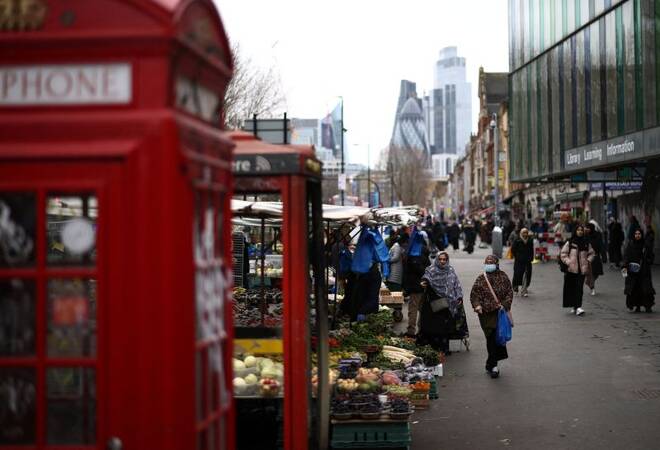Advertisement
Advertisement
UK economy shows zero Q4 growth, narrowly avoids recession
By:
LONDON (Reuters) - British gross domestic product was unchanged in the final three months of 2022, figures from the Office for National Statistics showed on Friday.
By David Milliken and William James
LONDON (Reuters) – Britain’s economy showed zero growth in the final three months of 2022 – enough for it to avoid entering a recession for now – but faces tough prospects in 2023 as households continue to wrestle with double-digit inflation.
Monthly gross domestic product data for December – when there were widespread strikes in the public sector, rail and postal services – showed a 0.5% contraction, the Office for National Statistics said, larger than the 0.3% forecast.
Even so, Friday’s figures will offer some relief to Prime Minister Rishi Sunak and his finance minister Jeremy Hunt, as they seek measures to spur a rebound in their upcoming annual budget on March 15.
Output fell 0.2% in the three months to the end of September – when many businesses shut briefly to mark Queen Elizabeth’s funeral – and another consecutive fall in output in the fourth quarter would have met Europe’s usual definition of recession.
Any respite is only likely to be temporary. The Bank of England forecast last week that Britain would enter a shallow but lengthy recession, starting in the first quarter of this year and lasting five quarters.
“The UK avoided a recession last year but by the slimmest of margins. Going by recent data revisions, today’s figures could well be revised downwards in a few months, painting a very different picture,” Deloitte economist Debapratim De said.
British living standards have been hammered by a surge in inflation, which hit a 41-year high of 11.1% in October, and firms and households will also feel an increasing impact from the BoE’s rapid increase in interest rates since December 2021.
Output in the fourth quarter was still 0.8% below its pre-pandemic level, in sharp contrast to other major advanced economies which are now above their pre-pandemic size.
ING economist James Smith said he expected Britain’s economy to contract by 0.3-0.4% in the first quarter of this year, and by a smaller amount in the second quarter.
“Recession, or at least a technical one, remains the base case. But this looks like it is going to be very mild by historical standards,” he said.

Slow covid recovery
Across 2022 as a whole, Britain’s economy grew by 4.0% after 7.6% growth in 2021, as it recovered from a historic blow from the COVID-19 pandemic.
Business investment in the final quarter of 2022 was 13.2% higher than a year earlier, and is now back at the same level as three years earlier, before the COVID-19 pandemic.
However, business groups have said future investment will be deterred by a steep increase in taxation on profits that takes effect in April, and on Thursday AstraZeneca said it would move some production to Ireland, partly because Britain’s health service drove a hard bargain on drug prices.
Retailers also reported cutting inventory levels due to reduced consumer demand.
December’s fall in GDP was driven by a fall in services output, including fewer medical operations, doctors’ visits and lower school attendance – partly due to strikes – while the men’s soccer World Cup in Qatar meant top-level domestic games were postponed.
The fall would have been greater if it had not been for unusually icy weather which led to increased energy generation, the statistics office said.
However, this also contributed to Britain’s biggest-ever trade deficit for goods, excluding precious metals, as the surging cost of gas imports from Norway pushed this up to a record 64 billion pounds ($78 billion) in the fourth quarter.
Hunt said Friday’s data showed the British economy was more resilient than expected, but still not clear of danger.
“We are not out of the woods – inflation is still much too high. That is causing pain for families up and down the country,” he told broadcasters.
The general secretary of Britain’s Trades Union Congress, Paul Nowak, called for Hunt to make room for bigger pay rises in next month’s budget – something Hunt has said would be too costly and would worsen inflation.
“It’s the fuel in the tank that our economy needs to get moving again,” Nowak said.
($1 = 0.8252 pounds)
(Editing by Kate Holton and Christina Fincher)
About the Author
Reuterscontributor
Reuters, the news and media division of Thomson Reuters, is the world’s largest international multimedia news provider reaching more than one billion people every day. Reuters provides trusted business, financial, national, and international news to professionals via Thomson Reuters desktops, the world's media organizations, and directly to consumers at Reuters.com and via Reuters TV. Learn more about Thomson Reuters products:
Did you find this article useful?
Latest news and analysis
Advertisement
